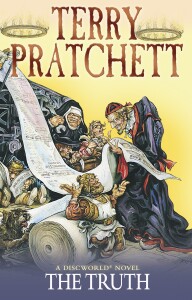 The title of the 25th installment in Terry Pratchett’s Discworld series is, like nearly everything about the book and the series, a sly reference to something in our own world. “The Truth” is the English translation of the Russian “Pravda,” which was the name of the old state-run Soviet propaganda newspaper, and this book is the story of the first newspaper in Ankh-Morpork, one of the chief cities of Discworld.
The title of the 25th installment in Terry Pratchett’s Discworld series is, like nearly everything about the book and the series, a sly reference to something in our own world. “The Truth” is the English translation of the Russian “Pravda,” which was the name of the old state-run Soviet propaganda newspaper, and this book is the story of the first newspaper in Ankh-Morpork, one of the chief cities of Discworld.
The protagonist of *The Truth* is one William de Worde, a congenital teller of truth and a lover of words, who finds himself almost against his will founding a newspaper. The plot, thin as it is, involves an attempt to frame the ruler of Ankh-Morpork for murder, as a way of installing a new leader who will be more amenable to certain business interests. Of course William, through his earnest and sincere efforts to report actual news in the city, stumbles onto the plot and has a hand in its undoing. The tale is also a parable of the beginnings of our own world’s Information Age, which of course has its own parallels in the changes wrought by the invention of movable type several centuries ago.
As a former newspaperman myself, I got a real kick out of a lot of the gags in The Truth. As a former journalist, Pratchett got a lot of details right. He also takes every opportunity to draw on many 20th century forms, from the detective novel to the newspaper movie about bumbling reporters and hardbitten editors.
The whole story is kicked off by the invention of the printing press — “a very nearly magical way of getting lots of copies quickly” — and its first appearance in Ankh-Morpork. To my delight, it is the dwarves who run the press, which is a sly jab at both real-world pressmen and the Tolkienish conception of these sturdy denizens of the underground. And of course there’s a “gal Friday” figure who starts out writing the “society news” and ends up being an ace reporter. Pratchett even nails the peculiar personal shorthand used by reporters the world over when they’re taking notes.
I got a kick out of a number of running gags, including one of the bad guys who liberally sprinkles his brief declarative sentences with the adjective “–ing.” And there’s plenty of silliness at the expense of the whole genre of fantasy fiction itself.
I think I can say without ruining it for anybody that the bad guys get their just desserts in the end, and the good guy ends up smelling like roses in spite of all the foul-smelling messes he falls into on the way. It’s all great fun, delightful escapism, and hip, literate nonsense, and it makes me want to go back and start reading other books in the “Discworld” series.
(HarperCollins, 2000)
